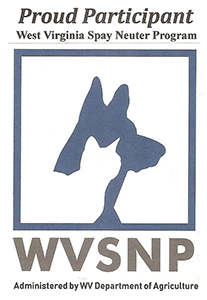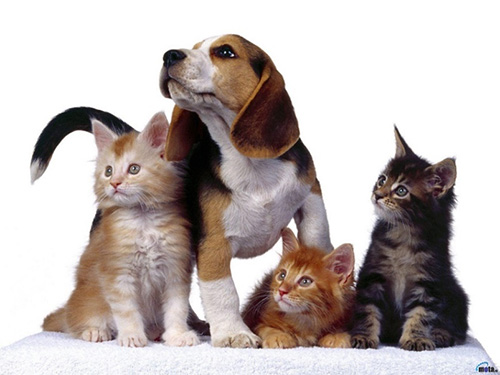
How It Works
The West Virginia Spay Neuter Assistance Program, or WVSNP, is a legislatively created program with the purpose of having more dogs and cats sterilized, thereby reducing shelter populations and costs, euthanasia rates and threats to public health and safety from rabies and other problems posed by the growing population of stray, feral and abandoned dogs and cats. WVSNP is administered by the West Virginia Department of Agriculture (WVDA).
WVSNP Advisory Committee
As permitted by the WVSNP rule, WVDA Commissioner Kent Leonhardt appointed a seven-member advisory committee that meets periodically to help guide WVSNP decisions. The members were selected to represent diverse geographical areas of the state as well as a wide range of pet/feral industry experience.
Their credentials and home counties are:
- Pet Food Industry – Monongalia County;
- Former Animal Shelter director – Kanawha County;
- Former Animal Control Officer – Wood County;
- 20+ years’ work in rescue/no-kill shelter – Monroe County;
- Veterinarian – Monongalia County;
- Federation of Humane Organizations in West Virginia – Randolph County; and
- Spay/neuter rescue work and grant programs – Preston County.
Guidance
West Virginia Code §19-20C-1, et seq.
West Virginia Code of State Rules §61-24-1, et seq.
Yes …… West Virginia is Special!!
The West Virginia Spay Neuter Program (WVSNP), administered by the WVDA, has been awarding grants to WV non-profits and government shelters since 2018. This program, funded by a small increase in a registration fee paid by pet food distributors doing business in WV, will continue through 2027.
In 2022, the Mug-Z-Moo Foundation contacted the Federation of Humane Organizations of West Virginia (FOHO WV) and offered to contribute to our statewide spay neuter efforts. Mug-Z-Moo has committed $4,050,000 to be distributed by FOHO WV over 3 years.
In 2023, FOHO WV allocated $450,000 to WVSNP and granted $900,000 to spay/neuter clinics located in 6 WV counties, resulting in twice the number of dogs and cats being altered.
The 2024 grants have been awarded, and we expect even greater success this year and next – thanks to the pet food distributors and the extraordinary support from Mug-Z-Moo.
Go to fohowv.org and join our animal advocacy efforts – WVSNP has a greater threat than a sunset.
 What does West Virginia have that only 4 other states have?
What does West Virginia have that only 4 other states have?
A statewide spay neuter program funded by the pet food industry.
What does West Virginia have that no other state has?
A $4M grant from the Mug-Z-Moo Foundation
WVSNP Procedures
WVSNP awards grants to local governments and 501(c)(3) organizations, which may issue vouchers to pet owners or use other means of advancing spay neuter services. Funds are provided to grantees on a reimbursement basis, and grantees are paid upon proper invoice demonstrating that the funds were appropriately spent.
How can I get my dog or cat spayed or neutered?
WVSNP is a grant program administered by the West Virginia Department of Agriculture by granting money to local organizations, humane societies, and local governments. These local grantees work with individuals to pay for spay/neuter services and an accompanying rabies vaccine. Please contact one of the agencies on the grantee list (available when the grant cycle opens this Spring) to arrange for procedures. WVSNP does not and cannot work directly with individuals to get spay/neuter procedures done.
Contact
Andrew Yost
spayneuter@wvda.us
Where do the funds for WVSNP come from?
Grants are funded by registration fees paid by pet food manufacturers who sell their products in West Virginia. The vast majority of such fees are paid by out-of-state corporations. Grants are not funded by taxes.
Applying for a Grant
If you are a county or municipal shelter or animal control organization, or a 501(c)(3) corporation, you may be eligible to receive WVSNP grant funding to advance spay and neuter services. WVDA accepts applications for funding annually, starting in mid-December, with a submission deadline on or around January 15.
| FY 2026 Application |
Procedures by County
- 0-24
- 25-99
- 100-249
- 250-499
- 500-999
- 1000-1499
- 1500-2000
- 2000+
Yearly Stats
History of WVSNP
WVSNP is the legislative result of citizens wanting a publicly funded statewide approach to overpopulation of stray cats and dogs in West Virginia. West Virginia’s feral cat and dog populations pose health and safety problems for humans and pets, impact wildlife, spread disease, and burden communities. Mitigating these problems is expensive, whether handled through county and municipal animal control, volunteer shelters and foster care, or euthanasia. Despite everyone’s best efforts, these resources are regularly overburdened.
In response, the framework of WVSNP was established in 2013, but the program was unfunded until House Bill 2552 was passed by the West Virginia Legislature and signed into law by Governor Jim Justice in 2017.
Each year, grants are made available to eligible county or municipal shelters and nongovernmental, 501(c)(3), entities incorporated in West Virginia. The Spay Neuter Fund is financed by Pet food product registration fees, not by taxes. Several hundred thousand dollars of grant funds are awarded every year, but many more funds are requested by applicant entities. Applicants are ranked based on a number of factors, including efficiency and past success. The ranking structure takes into account the special needs of rural, low population counties and emphasizes support to these communities. WVDA and the Spay Neuter Advisory Committee place a high priority on awarding grants to all eligible applicants, so even though all applicants cannot receive their full request, all eligible applicants receive at least some funding.
The goal of WVSNP is to lower the long-term societal costs associated with high stray and feral populations by increasing spay and neuter rates. Sterilization is a proven method to reduce these populations and associated costs over time. While not the whole answer, WVSNP is part of the answer to this problem in West Virginia. No step in the right direction is too small.
